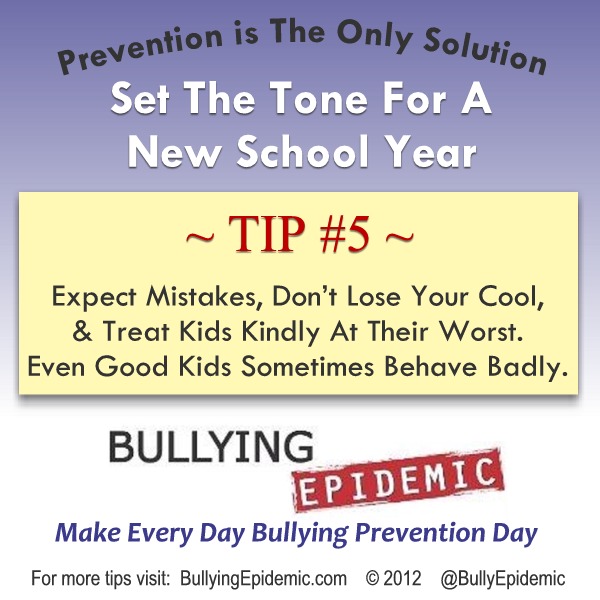The new school year is an opportunity for parents and teachers to put fresh emphasis on bullying prevention by supporting the development of healthy social groups and friendships.
Here are some daily tips for getting the school year off to a good start. These “press the reset button” ground rules also work well at the start of a new semester or outside school hours – for after-school teams or group activities. They work at home, too – anytime you want to clear the air and start fresh.
We’ll post a new tip each day, adding to our bullying prevention “toolkit”. Check back daily!
Click here for all Bullying Prevention Tips.
20 Tips For Bully-Free Schools – Tip #5
Expect Mistakes, Don’t Lose Your Cool, & Treat Kids Kindly At Their Worst.
Parents, Teachers and Coaches: The way we behave towards and around kids speaks as loudly as our words. When children behave badly, look on them as good kids who’ve made a mistake – one of many we’ve all made on the road to adulthood. When you view a (chronically misbehaving) child as “bad”, your view communicates itself clearly to the child and their peers. Hold kids to high standards, even with mistakes, and they will live up to our expectations. It’s a (long) process, helping to “grow” an adult!
Be prepared for mistakes and find ways to express your displeasure with words and a tone of voice that are still respectful. “Whoa, that didn’t work so well”, “Stop. You’ve gone too far”, “Reset, reset” – pick 1 or 2 phrases so your kids will learn those are the “Oh, oh, we’ve gone too far” messages. Find the words that work for you, speak in your own authentic voice.
Kids absolutely need to know when they’ve crossed the limits, but they are entitled to be treated with dignity and respect, even in their worst moments. Lead by example – demonstrate that everyone can choose to resist the temptation to give someone a (sometimes well-deserved) tongue lashing. The better you treat someone at their worst moments, the more it keeps the flashlight shining on the child’s mistake and puts pressure on them to change, instead of them deflecting their embarrassment into anger at you for yelling at or shaming them.


